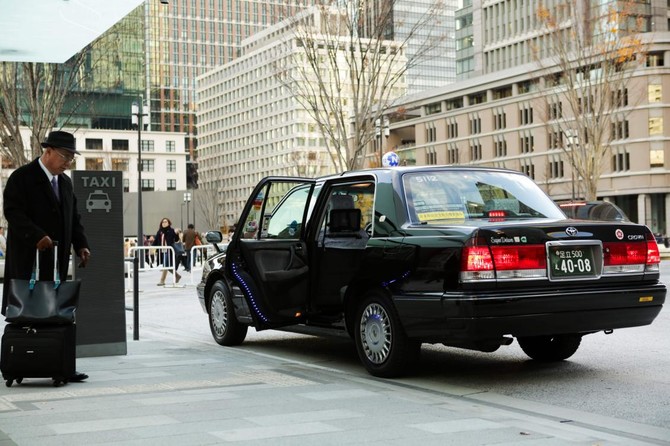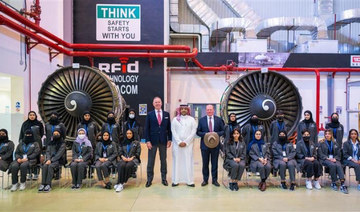TOKYO: Uber may be shredding business models for taxi firms the world over but it is struggling to make inroads in Japan, where risk-averse passengers prefer to stick to their high-quality traditional taxi service.
Japan, with its wealthy customer base and megacities like Tokyo, should represent rich pickings for Uber.
In 2015, the national market for taxis had a turnover of 1.73 trillion yen ($15.2 billion), according to transport ministry data.
There are 50,000 taxis in Tokyo alone — instantly recognizable with their impeccable polished exteriors and doors that open automatically to let valued customers board effortlessly.
And with hailing a taxi rarely taking more than a few seconds in the major cities, there has been sluggish take-up of Uber, where consumers order an unlicensed car via smartphone.
“Japanese people don’t like taking risks, they are risk averse. They are quite strict when it comes to the quality of service,” said Ichiro Kawanabe, CEO of Nihon Kotsu, the main Tokyo taxi firm founded by his grandfather in 1928.
Given this, “when Uber tried to messily enter the market, no one wanted them,” Kawanabe, who is also chairman of the Japanese taxi federation, told AFP.
Uber also ran up against local legislation — it is strictly forbidden to operate a taxi without a license.
So it tried to enter the Japanese market via another route, setting up a pilot carsharing service in 2015 in the western city of Fukuoka.
Uber said it was a study into the needs of the local community but authorities quickly slammed on the brakes, saying it could be considered an unlicensed taxi service and raising questions of safety.
Kawanabe also pointed to safety issues as being among the reasons Uber had not enjoyed the same success in Japan as it has elsewhere.
“When an accident happens, they don’t take responsibility and say they are just a platform provider. Japan cannot accept this.”
An Uber spokesman said the company’s priority in Japan was to “partner with taxi companies to get licensed drivers using the app to connect with riders.”
The firm has started another pilot system in two rural towns connecting senior citizens with people willing to drive them around and this time the authorities have not clamped down, as it compensates for a lack of public transport and taxis in the areas.
Japan is also a “very important” market for UberEATS, its take-away food delivery service, the spokesman said.
And Kawanabe, a suave and charismatic 47-year-old known as the “prince of taxis,” admitted that Uber had been useful in foisting change on the conservative Japanese taxi industry.
Around nine out of every 10 cab rides in Tokyo is hailed or taken from a rank, with only 10 percent ordered via smartphone, said Kawanabe.
The main reason for this is that fewer than half of the taxis in Tokyo are connected to a smartphone, he said.
“They still use old feature phones instead of smartphones. It’s very difficult for us and app operators to convince them to use apps,” he complained.
In addition, around 80 percent of taxi fares are paid in cash.
This conservatism — combined with excellent public transport systems — led to a decline of one third in taxi passengers between 2005 and 2015, according to the transport ministry.
The industry is just starting to fight back — dropping fares for short rides around Tokyo, for example.
“It took me two years to convince them (to reduce fares) ... and there is still so much that needs to be done,” said Kawanabe.
He has set up a start-up subsidiary, JapanTaxi, to develop apps to connect drivers with passengers and aims to launch a carsharing app next year to push down costs.
But the competition is ferocious.
On the app front, Chinese app developer Didi Chuxing is expecting to launch in Tokyo next year, in partnership with a rival taxi firm.
And Uber is hoping for a large investment from Japanese communications behemoth Softbank.
Between Kawanabe and Uber, there is no love lost.
“They are just so rude, in every way. They think they are like gods and that we are so obsolete,” he said.
“From the point of view of the Japanese taxi companies, you can only call them ‘devils’.
Faring badly: Uber struggles to make inroads in Japan
Faring badly: Uber struggles to make inroads in Japan

PIF’s Alat unveils electrification, AI infrastructure business units

RIYADH: Alat, a flagship company of the Public Investment Fund, unveiled two business units in electrification and AI infrastructure, to establish Saudi Arabia as a premier manufacturing hub globally.
The company unveiled its plans during the Milken Institute Conference held in Los Angeles.
According to a press release, the move comes as part of the PIF company’s strategic vision to spearhead a paradigm shift in industry sustainability while propelling Saudi Arabia on the global stage.
Alat Global CEO Amit Midha said: “I am pleased to announce these two exciting new divisions as they will make a significant contribution to Alat’s overall strategic goal of developing an advanced, sustainable future for the industry.”
The electrification arm will fortify grid technology, catering to the burgeoning demand for electricity driven by exponential growth in renewable energy sources like solar, wind, and hydrogen.
By harnessing Saudi Arabia’s solar energy and other clean resources, the firm seeks to manufacture innovative solutions that will catalyze the global energy transition and drive decarbonization in industry.
The electrification unit will specifically focus on enhancing transmission and distribution technologies, facilitating the integration of renewable energy into existing grids, and pioneering advancements in gas and hydrogen generation and compression technologies.
On the other front, the AI Infrastructure business unit will address the escalating global demand for AI capabilities across industries.
This entails the development of cutting-edge technologies encompassing network and communications equipment, servers, data center networking, storage, industrial edge servers, and Industry 4.0 computing.
“The global electrification market size reached $73.64 billion in 2022 and it is expected to hit around $172.9 billion by 2032, growing at a CAGR of 8.91 percent between 2023 and 2032,” the press release added.
The global AI Infrastructure market is set to hit $460.5 billion by 2033, with a robust 28.3 percent compound annual growth rate, driven by widespread adoption across industries for innovation, decision-making enhancement, and task automation.
As a gold sponsor at the Milken Institute Conference, the firm now has nine business units focused on sustainable technology manufacturing.
“Alat will invest $100 billion by 2030 across these business units to develop key partnerships and build advanced manufacturing capabilities in Saudi Arabia to bring jobs and economic diversification to the Kingdom,” the press release said.
Saudi Arabia’s Qiddiya to build region’s largest water theme park

- Aquarabia will also feature the first underwater adventure trip with diving vehicles
RIYADH: Saudi Arabia Qiddiya Investment Co. will construct the region’s largest water theme park as a cornerstone of its Six Flags Qiddiya City venture it was announced on Monday.
To be named Aquarabia, Qiddiya hopes to draw visitors from around the globe with 22 attractions and water experiences suitable for all family members, as well as some “world-first” attractions, Saudi Press Agency reported.
These attractions include the world’s first double water loop, the tallest water coaster with the highest jump, the longest and highest water racing track, and the tallest water slide.
Aquarabia will also feature the first underwater adventure trip with diving vehicles, catering to adventure enthusiasts with water sports areas designated for rafting, kayaking, canoeing, free solo climbing, and cliff jumping.
Additionally, the park will introduce the first surfing pool in the Kingdom, incorporating immersive design elements themed around ancient desert water springs and Qiddiya’s wildlife.
With sustainability in mind, Aquarabia will implement advanced systems capable of reducing water waste by up to 90 percent and decreasing energy consumption. As part of the Six Flags Qiddiya project, the venture, the first Six Flags of its kind outside North America, aims to recycle operational waste, diverting over 80 percent from landfill.
Scheduled to open in 2025, both Aquarabia and Six Flags Qiddiya City are situated within Qiddiya City, forming a fully walkable neighborhood offering a diverse array of activities, accommodations, dining options, and relaxation spots.
Abdullah Al-Dawood, managing director of Qiddiya Investment Co., hailed the announcement as a significant milestone for Qiddiya and the entertainment, tourism, and sports sectors in the Kingdom.
He emphasized that the projects will cater to diverse entertainment needs while contributing to economic diversification and job creation in the tourism sector.
The project also aims to meet the growing local demand for immersive entertainment experiences, particularly in water activities, aligning with the goals of Saudi Arabia’s Vision 2030 to enhance local tourism and employment opportunities.
The unveiling of Aquarabia follows the announcement of several other entertainment, sports, and cultural attractions in Qiddiya, including the world’s first multi-use gaming and electronic sports area, the multi-sport Prince Mohammed bin Salman Stadium and the Dragon Ball amusement park.
Saudi Arabia ascends as key destination for global talent: BCG report

RIYADH: Saudi Arabia has emerged as a key player in attracting global talent amid ongoing geopolitical shifts and financial uncertainty, moving up two spots on the list of preferred countries for workforce mobility.
The “Decoding Global Talent 2024” report by Boston Consulting Group highlights Saudi Arabia’s rise to the 26th most preferred country, underscoring the success of the Kingdom’s strategic initiatives to position itself as a global hub for professionals.
This fourth edition of the study draws insights from over 150,000 professionals across 188 nations, tracking global talent trends since 2014.
Riyadh’s rise to the 54th rank globally underscores its emergence as a hub of opportunity and progress in the eyes of global talent.
Christopher Daniel, managing director and senior partner at BCG, said: “As the global talent shortage becomes an increasingly pressing challenge for the world's foremost economies, Saudi Arabia is emerging as a pivotal player in narrowing this gap.”
He added: “With a significant proportion of respondents citing the quality of job opportunities, the attractive income, tax, and cost of living, as well as the assurance of safety, stability, and security as key reasons for choosing the Kingdom, it’s evident that Saudi Arabia’s strategic investments in its labor market are bearing fruit.”
Daniel noted that the Kingdom is leveraging labor migration to enhance its workforce, offering a secure and hospitable environment that caters to the diverse needs of international professionals.
“By fostering a job market that is attuned to the evolving aspirations of global talent while prioritizing their well-being, Saudi Arabia is positioning itself as a compelling destination for those seeking growth and fulfillment in their careers,” he said.
Furthermore, the report highlights that younger generations and individuals from rapidly expanding populations are particularly attracted to global mobility, pursuing diverse experiences and opportunities for professional growth.
With 23 percent of global professionals actively pursuing international positions and 63 percent remaining receptive, Saudi Arabia is well-positioned to capitalize on this trend.
The Kingdom offers an enriching environment for a globally oriented workforce to excel and progress in their careers, presenting an enticing option for individuals seeking both personal and professional advancement in an ever more interconnected global landscape.
Riyadh Air to expand fleet with additional aircraft orders, CEO reveals

RIYADH: Saudi Arabia’s Riyadh Air plans to bolster its aircraft lineup through additional orders, as it requires “a very large fleet” to establish itself alongside regional giants, stated the CEO.
This move comes as the Kingdom’s second flag carrier, backed by the country’s Public Investment Fund, ordered 39 Boeing 787-9 jets last year, with options for 33 more.
It also aligns well with Saudi Arabia’s goal to expand its aviation industry and attract more tourists, broadening its airline capacity beyond pilgrimage travel, which currently forms the backbone of the country’s inbound tourism.
“We need a very large fleet, we’re going to make a number of additional orders,” CEO of Riyadh Air, Tony Douglas, said in an interview with Bloomberg Television.
He added: “We will be making a narrowbody order, we’ll probably be doing another large order after that to build us up to scale.”
During the interview, Douglas, who previously led the Abu Dhabi flag carrier Etihad Airways, expressed being “very conscious” of potential delays to aircraft deliveries. This concern arises as both Boeing and Airbus SE grapple with production challenges amidst record demand and supply issues at the two plane makers.
The establishment of a second Saudi national airline alongside the existing flag carrier Saudia is part of the Kingdom’s economic diversification plan.
In November 2023, Douglas expressed confidence in the demand for travel. “We’re not well enough connected. It’s as simple as that,” he said at the time.
The new airline stands to benefit from Saudi Arabia’s rapidly growing economy and the increasing influx of tourists to the Kingdom. Riyadh Air does not intend to pursue mergers and acquisitions to fuel its growth. “No, it’s organic,” Douglas emphasized at the time.
The initial destinations will include major cities in Europe, the US East Coast, and Canada, with the inaugural flight scheduled to depart by June 2025.
By that time, Riyadh Air will have secured slots at major airports, Douglas mentioned, although hubs like London Heathrow are already operating close to capacity.
“It won’t be easy ... but we have no reason to be anything other than confident that we’ll resolve all of that,” he said at the time.
Saudi Arabia and Egypt retain top spots in MENA travel preferences: Wego study

RIYADH: Saudi Arabia and Egypt remain dominant destinations among Middle East and North Africa travelers in 2024, retaining top spots in international preferences, according to a study.
Singapore-based travel booking app Wego ranked Egypt as the top destination for tourists from the region between January and April, followed by the Kingdom, with India consistently holding the third spot since 2016.
Saudi Arabia’s second spot on the wish list is a clear indication of the Kingdom’s progress as a global tourist destination, aligning with its National Tourism Strategy aiming to attract 150 million visitors by 2030.
“We are excited to see Egypt emerge as the leading destination for travelers in the MENA region during Q1 2024. According to Wego's data, Egypt stands out as a favored choice among travelers seeking unique cultural experiences and diverse attractions,” said Mamoun Hmedan, chief business officer at Wego.
He added: “Meanwhile, the United Kingdom retains its position as the preferred European destination for Middle Eastern travelers.”
Among Middle East destinations, the top three — Egypt, Saudi Arabia, and UAE —maintained their positions from 2023. Egypt and the Kingdom, in particular, have consistently held the top two spots since Wego began tracking customer trends over a decade ago.
The study utilized traveler searches and hotel booking data from its website as the foundation for its findings.
The report further revealed that the UAE ranked as the fourth favorite destination, followed by Pakistan, Kuwait, and Turkiye.
Meanwhile, China dropped one spot, reaching the 27th top destination among MENA travelers.
The UK remains the top European destination from the Middle East, holding the first spot for 10 of the last 11 years, briefly overtaken during the pandemic. Italy has notably surged from fourth to second.
Italy, a top global tourist spot, consistently ranks in the top ten European destinations for Middle East travelers.
This year marks Italy’s debut in the top three. Joint investments between Saudi Arabia and Italy in late 2023, along with direct flights by ITA Airways to Riyadh and Jeddah, signify growing ties.
Countries farther from the Gulf region, such as Morocco, Indonesia, and the US experienced the most decline among top destinations.
This trend continued in 2024, with Malaysia, the Philippines, and the US dropping out of the global top 10, while Kuwait, Pakistan, and Jordan, which entered the top ten last year, remain preferred destinations for MENA travelers.

















